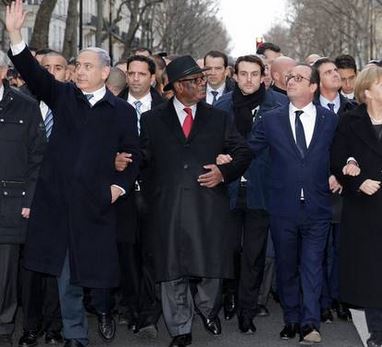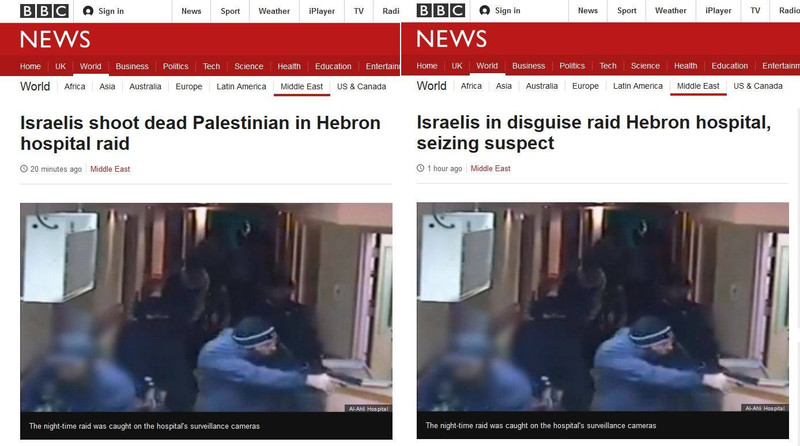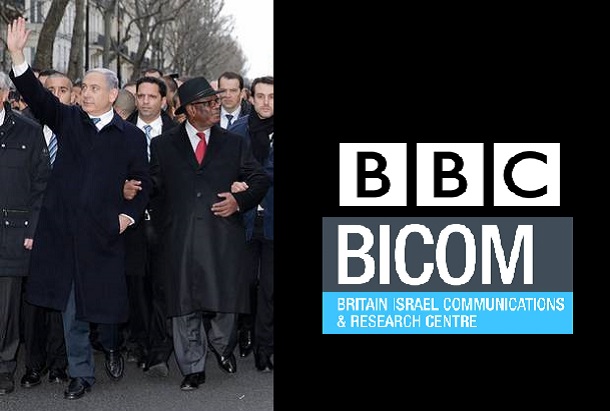|
Are Israel and Saudi Arabia really ‘friends’ of press freedom?
Wait, what about free speech? Ce qui est arrivé à…’Je Suis Charlie’?
Back in April, 21WIRE discovered in interesting media anomaly which no other media outlet picked up.
The New York Times had run a front page story in their early morning US domestic print edition, with a headline that read:
“Saudi Defiance on Yemen Reflects Limits of U.S. Strategy”
 PRESS INTIMIDATION: Netanyahu’s photo-op at Charlie Hebdo seems even more meaningless now after bullying BBC. Later, we looked for this same article online, only to find that the headline has been changed to:
“Saudi Resolve on Yemen Reflects Limits of U.S. Strategy”
Why? Was pressure applied on the NYT editors, and if so, who applied pressure to the editors to make such a significant change on a lead story to change it from ‘Defiance’ to ‘Resolve’? In an effort to sanitize the carnage in Yemen, did Saudi Arabia throw its weight around, causing NYT editors to cave in?
Perhaps a much worse situation happened yesterday with BBC and Israel, with Israel pressuring the BBC into changing its headline (see full report below). Who did Israel manage to do this to the BBC? Incredibly, it not only time that Israel has used intimidation to make the BBC to change its headlines. On at least one occasion, Israel even demanded an official apology from the BBC and issued a threat to revoke press cards of BBC journalists working in Israel.
Very few people are aware that the pressure applied to the BBC emanates from an Israel lobby organization that’s embedded in the UK called BICOM (Britain Israel Communications and Research Centre). They claim to be, “An independent organisation devoted to creating a more supportive environment for Israel in the UK.”
As we can now see, it’s anything but independent, and its hardly supportive, especially when it comes to press freedom and free speech.
BICOM’s mission is simple: to sanitize UK media coverage in the in the event that Israel is ever exposed doing what it does on a daily basis: oppressing the native Palestinian population.
A Dark Double Standard
Imagine if Russia, or any other country were caught trying to run a media racketeering scam like this. The western media would be awash with righteous indignation. But when Israel does it? Not even a mention anywhere in the press. So it should come as no surprise how Israel has been able to get away with running a brutal, racist apartheid state for long.
What’s even more ridiculous is the meme we hear so often – that “Israel is the only democracy in the Middle East” (no if you are Palestinian, and not if you are western press).
It’s yet another example of the BBC being in violation of its public broadcasting charter by willfully deceiving the public – and not standing up for freedom of the press in Britain. Tragic.
 Before (left) and after: a BBC headline was changed to obscure the fact Israeli killed a Palestinian in cold blood. (Screenshots by Media Lens) Electronic Intifada reports:
In the early hours of 12 November, approximately two dozen Israeli gunmen, one disguised as a pregnant Palestinian woman, others wearing fake beards, invaded a hospital in Hebron and gunned down a 28-year-old man.
In a rare burst of reporting on an Israeli atrocity, the BBC ran an article on its website headlined: “Israelis shoot dead Palestinian in Hebron hospital raid.”
It was a straightforward headline which summed up the story. But later in the day, a different headline appeared above the report, reading: “Israelis in disguise raid Hebron hospital, seizing suspect.”
As is standard practice for the BBC, the amendment was not noted at the bottom of the page, so newcomers to the story would not have known the headline had been altered.
It was spotted, however, by the watchdog Media Lens, which posted a screengrab of the two headlines on its Facebook page, asking: “What happened? Pro-Israeli flak? Bending to pro-Israeli pressure?”
These questions are even more pertinent in the light of a documented exchange which took place between the BBC, the Israeli Government Press Office (GPO) and the Israeli embassy in London at the beginning of October about another of the broadcaster’s headlines.
Headline changes
The Times of Israel reported then on Israeli fury sparked by the 4 October BBC Online headline “Palestinian shot dead after Jerusalem attack kills two.”
The headline is factually correct, but ‘offense’ was caused to Israel’s PR machine because the killing of 19-year-old Muhannad Halabi took precedence in the headline over the slaying of two Israelis.
The Times of Israel wrote: “The [Israeli] Government Press Office on Sunday warned the BBC it could face sanctions for running a news headline highlighting the death of the Palestinian terrorist shot by the police Saturday after fatally stabbing two Israelis, rather than the attack itself.”
The website added that a “harshly worded letter was sent to Richard Palmer, the head of the BBC Bureau in Israel, by the head of the GPO,” and that “the Israeli Embassy in London asked the network to change the headline.”
Whatever the GPO’s harsh words were, they appear to have been enough to scare the BBC into changing the headline, which went through three alterations – documented by the Zionist lobby group BBC Watch – before it met with the satisfaction of the Israeli embassy and the Israeli GPO.
The Israeli-approved headline ran: “Jerusalem: Palestinian kills two Israelis in Old City.”
(This headline has since been changed again, apparently unnoticed by either the Israeli embassy or the GPO, to “Israelis killed in Jerusalem, Palestinians banned from Old City.”)
In its report of 4 October, The Times of Israel noted: “According to a GPO official, Israel expects an official apology from the network, and said the office was considering annulling the press cards of BBC journalists, a decision that if implemented would not allow the network to continue operating in Israel.”
This is not an idle threat, and BBC staff know it.
“A very evil light”
In 2003, the Israeli government severed ties with the corporation, accusing it of the “worst of Nazi propaganda” after it broadcast the documentary Israel’s Secret Weapon which shed light on the country’s nuclear and chemical arsenal.
Danny Seaman, then head of the Israeli GPO, said it was “because of what we feel to be a bias and an anti-Israel line … that portray Israel in a very evil light.” Seaman said government officials would no longer help BBC journalists get expedited press accreditation.
When Orla Guerin, then a BBC Middle East correspondent, questioned Israel’s repressive attitude towards the corporation, she too found herself in the Israeli government’s line of fire.
In an interview with the London Evening Standard in 2003, she said, “How can you still be a democracy and try to harass the press? This is not how a democracy behaves.”
Guerin was later pulled from the Middle East, the decision being announced just days after the BBC’s director general at the time, Mark Thompson, returned from a visit to Israel in 2005 where he met with then Prime Minister Ariel Sharon.

[Undue] Influence
Journalist Keith Dovkants, writing in the London Evening Standard in 2012, noted that “on [Thompson’s] return to London the corporation instituted the Middle East reporting regime that exists today and which, many believe, influenced the decision to refuse to show the charity aid appeal for Gaza.”
This is a reference to the Disasters Emergency Committee appeal of January 2009, which was aired by major television channels to raise money for Gaza as another Israeli massacre there came to an end. But the BBC, in an unprecedented move, refused to show it.
Arthur Neslen, a journalist who worked at the BBC for four years, told me: “They take Israeli calls very seriously, and critical stories about Israel get shot down through official pressure and the fear of official pressure. These are very powerful lobbyists — people know their careers can be broken.”
Swedish academic and media expert Leon Barkho told Dovkants: “I have investigated this and I am convinced [BBC] policy is dictated from the top because of the enormous sensitivity … The message is: don’t antagonize the Israelis.”
And so the questions asked by Media Lens when the BBC amends a headline to soften public perception of an Israeli crime — “What happened? Pro-Israeli flack? Bending to pro-Israeli pressure?” – answer themselves.
It is a sad state of affairs for a news organization which prides itself as a leader in global journalism. BBC journalists and editors, it would seem, sit at their desks in London and cower in fear at the thought of an angry phone call from the Israeli embassy.
They let us all down, but, most of all, they let down the Palestinian people, whose cry for freedom goes unheard at BBC Broadcasting House, drowned out by the undemocratic machinations of the Israeli PR machine.
|